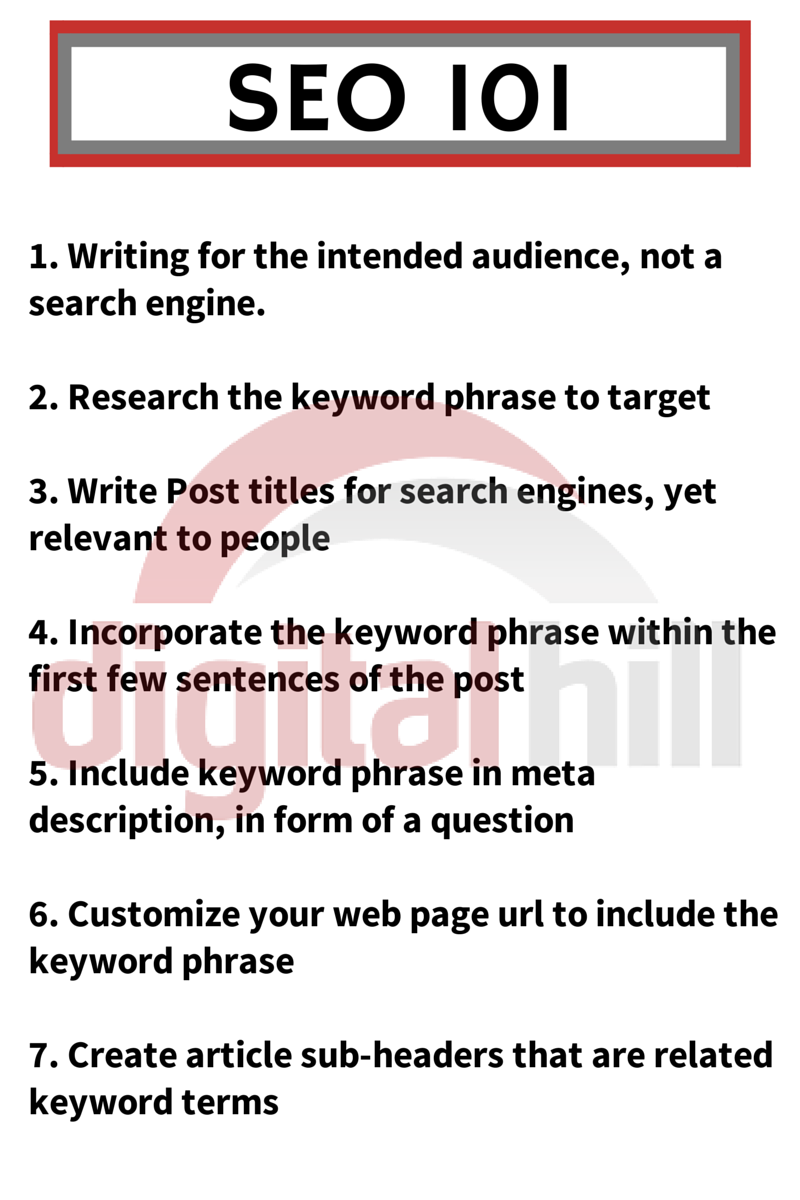SEO 101 for your Web Page
“Why doesn’t my website come up in Google when you type the term [fill in blank with your product]??”
If I had a dollar for every time I’ve been asked that, I’d be a wealthy man! Every business wants to come up first, or at least on the first page when a search for their key product or service is typed into a search engine like Google. This is, in fact, important because web searchers typically scan no lower than the first 6 results given for any search before making a decision on one of those web pages to visit.
The key, however, is in knowing what helps a page rank well and what should be done on every web page for search engine optimization (SEO). Since Google is the most dominant Search Engine with average monthly search shares of 63-70% (of all searches done on the web in a search engine), it makes sense to pay attention to what Google outlines and to changes in their algorithm that impacts search rankings.
“Algor” what?
Yes, that’s right. Google has a very in-depth programmatic method that helps them evaluate any web page or blog post and ultimately determine its ranking for keyword phrases.
Google’s Search Engine Algorithm
I’ll keep it simple by saying that Google is most interested in returning the best quality, relevant results for the searches that users input into their search engine. It makes sense. Google wants people to find the best answer for the question they type in. Since “Search Engine Optimization” started years ago, the role of SEO specialists was to help their clients come up on top for searches of key terms they wanted to rank for. This led to some SEO work that tried to manipulate Google’s search ranking method, and Google subsequently would modify the search method based on their new technology and to overcome and punish sites that were trying to “game” the system.
Google wants to combat methods that try to artificially increase the rank of content when the content on a web page is not worthy of that ranking. It’s an ongoing challenge and Google has made multiple shifts in the past couple of years with algorithm changes to keep things pure. Each time they do, some SEO tactics need to shift, while some core “quality content” items remain. We’ll leave the more in-depth SEO tactics that are current to another time and focus on the more timeless search ranking keys that every website owner and Internet marketer should implement.
SEO Basics for Web Pages
When trying to have your website and a web pages rank for certain keyword phrases, the most basic key is regularly adding new, quality pages or blog posts to your site. Google is looking for active sites that are regularly updated. Second, when you post a new web page or blog article, the key items to focus on are:
- Writing for the intended audience, not a search engine. This means writing content that is quality, helpful, and a valuable resource.
- Determine the keyword phrase you want to target. Do you know what actual phrase that web users are typing into Google related to your product/service? You can! Use tools like Google Correlate, Keywordtool.io, or paid services like SEMrush and MOZ to learn the exact phrase that are searched the most for key terms.
- Then, when you write your post, make sure to write titles for search engines, and yet make sure that they read well to the audience. This means including your targeted keyword phrase in the title, typically within the first few words of the title.
- Be sure to incorporate the keyword phrase within the first few sentences of the web page or blog post, typically as part of the introductory paragraph.
- After this be sure to include the keyword in the meta description. I recommend it is in the form of a question, such as: “Interested in <keyword phrase>? Discover the key points here..” Why do this? It’s because search engine results include the title of the article, the meta description, and the URL to the page. They also “bold” the keyword phrase match so this brings more visual focus to your search result and the question can invite the use to click through to learn more.
- Customize your web page url to include the keyword phrase. Search Engines will skip pronouns and articles so leave out “the”, “of” etc., in your URL’s but include your keyword terms.
- Create article sub-headers that are related keyword terms and make these sub-headers stand out. Typically, website and blog readers are skimmers so by including headlines for different sections you help visitors skim and understand the article content as well as you help inform search engines about the topical focus for your post.
Keeping those 7 SEO basics in mind when writing web pages and blog posts can help your content rank well in search engines. Search ranking is a ever-changing arena, but these keys have remained constant for years and serve as the foundation that every page should start from. Have questions? Email techtalk@digitalhill.com.


